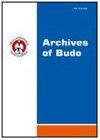Oxidative stress in young judokas: Effects of four week pre-competition training period
IF 1.5
3区 医学
Q3 SPORT SCIENCES
引用次数: 7
Abstract
Background The effects of long-term exercise on steady-state dynamics of antioxidant defence system are not clear yet fully, and there is an evident lack of studies focused on combat sports. This study aimed to evaluate the parameters of oxidative stress in young judokas during four weeks pre-competition training period. Material/Methods: Changes of oxidative stress parameters (malondialdehyde, catalase, carbonyl and sulphydryl groups, and total antioxidant status) were studied during four week pre-competition training period on a sample consisting of 10 male judokas (age 20±1.3 years, sport experience 11±3.4 years). Results: The changes in all examined oxidative stress parameters showed no statistical significance. Results also suggested that well-developed anti-oxidant defence, particularly because of the superoxide dismutase activity, kept the amount of oxidized proteins unmodified. The explanation for this finding can be found in the facts that the subjects, although of young age, had a long training and competitive experience with the similar training programs and that they did not undergo rapid weight reduction. Conclusions: The obtained results suggest that four week pre-competition training period pattern had no effects on oxidative stress parameters in well-trained young judokas, and that natural antioxidant defences of the body responded adequately to complex training program.青少年柔道运动员的氧化应激:4周赛前训练期的影响
长期运动对抗氧化防御系统稳态动力学的影响尚不完全清楚,且明显缺乏针对格斗运动的研究。本研究旨在评估青少年柔道运动员在赛前4周训练期间的氧化应激参数。材料/方法:研究10名男性柔道运动员(年龄20±1.3岁,运动经验11±3.4年)在4周的赛前训练期间氧化应激参数(丙二醛、过氧化氢酶、羰基和巯基以及总抗氧化状态)的变化。结果:各组氧化应激参数变化均无统计学意义。结果还表明,良好的抗氧化防御,特别是由于超氧化物歧化酶的活性,使氧化蛋白的数量保持不变。对这一发现的解释可以从以下事实中找到:实验对象虽然年轻,但在类似的训练项目中有长期的训练和竞争经验,而且他们没有经历快速减肥。结论:4周的赛前训练模式对训练良好的年轻柔道运动员的氧化应激参数没有影响,身体的天然抗氧化防御能力对复杂的训练计划有充分的反应。
本文章由计算机程序翻译,如有差异,请以英文原文为准。
求助全文
约1分钟内获得全文
求助全文
来源期刊

Archives of Budo
SPORT SCIENCES-
CiteScore
2.80
自引率
47.60%
发文量
0
审稿时长
>12 weeks
期刊介绍:
Archives of Budo is an international peer reviewed journal publishing articles on various aspects of the sports sciences covering education and research in martial arts and combat sports, and related areas like biomechanics, kinesiology, medicine, psychology, sociology, technologies of sports equipment, research in training, selection, performance, survival, and other interdisciplinary perspectives.
Archives of Budo editors endorse the principles embodied in the Helsinki Declaration and expect that all research involving humans has been performed in accordance with these principles. All human studies must have been approved by the investigator''s Institutional Review Board. A copy of the relevant documentation should be included with the manuscript. Furthermore Archives of Budo follows the ICMJE''s Recommendations for the Conduct, Reporting, Editing and Publication of Scholarly Work in Medical Journals.
Archives of Budo provides free, immediate and permanent online access to the full text of all articles distributed under the terms of the Creative Commons Attribution Non-commercial License http://creativecommons.org/licenses/by-nc/4.0), which permits use, distribution, and reproduction in any medium, provided the original work is properly cited, the use is non-commercial and is otherwise in compliance with the license.
 求助内容:
求助内容: 应助结果提醒方式:
应助结果提醒方式:


